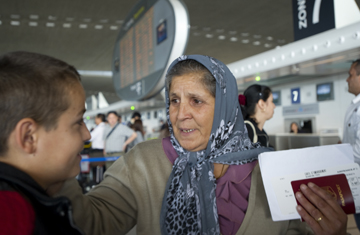
A Roma woman, Georgineta, says goodbye to her grandson before boarding a flight to Romania at Charles de Gaulle Airport in Paris on Aug. 19, 2010
France has begun the first deportations of 700 members of the Roma Gypsy minority, to Romania and Bulgaria, as part of its controversial crackdown on communities officials hold responsible for criminal activity. The expulsions are set to be completed by the end of the month. Also affected by the law-and-order push are the nomadic "travelers" group the Roma are a subset of; delinquents and their families in France's troubled suburban housing projects; and human traffickers and the illegal immigrants they smuggle into France. But the highly publicized targeting of Roma in particular has been criticized by opposition politicians as a cynical move by the conservative government of President Nicolas Sarkozy to seduce hard-right voters in the long march toward the President's 2012 re-election bid. It's also raising alarms from Romanian and European Union officials that France's drive may be fanning xenophobia and impinging on the rights of fellow E.U. citizens. Romania has been a member of the E.U. since 2007.
An initial flight took 79 Roma to their Romanian homeland on Thursday, with at least 292 additional deportations scheduled to take place over the next week. Interior Minister Brice Hortefeux said 51 illegal camps inhabited by migrant Roma had been raided and broken up by police since late July. Apart from the 700 Roma from those camps to be expelled by the end of August, thousands more will follow as Hortefeux presses ahead with the dismantling of half of the 600 illegal camps in the next three months. Sarkozy embarked on the action on July 21, less than a week after youths from one of the transient communities ran amok in Saint-Aignan, south of Blois, to protest the alleged killing of one of their peers by police.
Opposition politicians and human-rights organizations have widely condemned the operation as abusive and racist, saying the Roma have too often been Europe's scapegoats. Other observers pointed out that the itinerant people involved in the Saint-Aignan violence weren't Roma but part of the far larger travelers communities, whose members are virtually all French citizens. Critics have said the more narrow focus on Roma is an effort by Sarkozy's government to divert attention from dismal approval ratings and the scandals that have dogged it for months. Even members of Sarkozy's ruling majority have expressed concerns over the moves. Parliamentarian Jean-Pierre Grand recently lamented what he called the rafles of Roma — a term used to refer to the notorious roundups of Jews during the Nazi occupation of France.
Despite the criticism, government officials moved ahead with the plan, which included not just Thursday's deportations but also a raid on a new Roma camp in southeastern France. Such high-profile strutting is getting a little harder to do, however. On Aug. 18, the E.U. Commission for Justice, Fundamental Rights and Citizenship reminded France of the "freedom of movement for E.U. citizens." It also warned that it would be watching France closely to make sure due process and the rights of European Roma were being respected.
Around the same time, Romanian Foreign Minister Teodor Baconschi stepped into the fray, advising Paris not to use Roma as scapegoats for political advantage. "I am worried about the risks of populism and xenophobic reactions," Baconschi told Radio France International. He isn't the only one. Last week, a U.N. human-rights report decried what it called "a notable resurgence in racism and xenophobia" in France. It cited repeated French government initiatives that stigmatize foreigners and minorities — including a national debate on French identity and the anti-Roma drive — as contributing factors.
But Paris is on firm legal ground: it requires Romanian and Bulgarian citizens to obtain resident permits for stays of more than three months under the seven-year transition conditions set when both nations joined the E.U. in 2007. (Most Roma wouldn't meet the residency requirement of stable employment.) Meanwhile, France also manages to get the Roma to return home "voluntarily": deportees receive a payment of $386 per adult and $129 per child if they leave. Such sums, Paris says, are to allow impoverished Roma to set up a viable life at home — and stay there.
How, then, might opponents force Sarkozy to alter his anti-Roma drive? Perhaps by pointing out that despite the attention Sarkozy is drawing to the operation, his latest push is not new — nor does it work. Last year alone, around 10,000 Roma — or two-thirds of their estimated population in France — were deported, most with French taxpayer money in their pockets. Virtually all returned to France weeks later, according to international Roma organizations. Also, prior to Thursday's deportations, 25 similar flights returned Roma to Bulgaria and Romania since January. The total for 2009 was 44 flights. Meaning, there's nothing new to the current French expulsion of Roma except the shouting — and a crass calculation to win votes through xenophobia.
